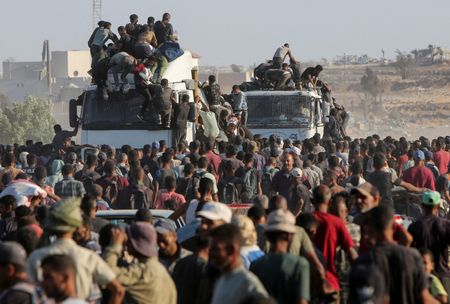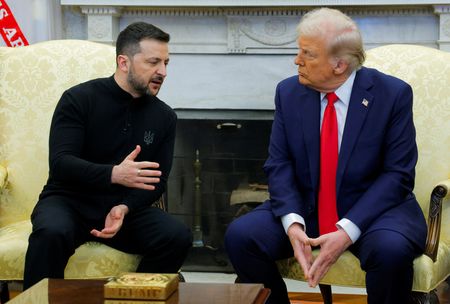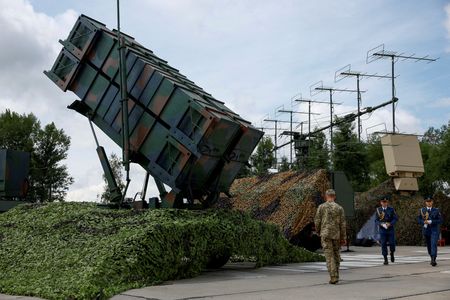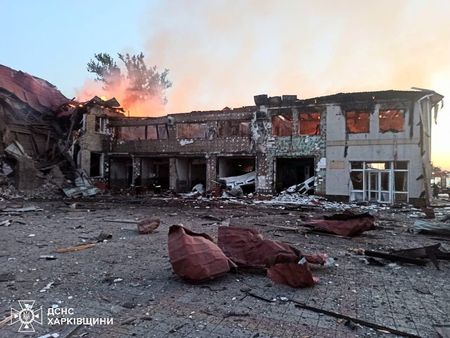By Alexander Cornwell and Nidal al-Mughrabi
TEL AVIV/CAIRO (Reuters) -Israeli Prime Minister Benjamin Netanyahu favours a complete military takeover of Gaza, media reported, and was to meet senior security officials on Tuesday to finalise a new strategy in the 22-month war.
Mediation between Israel and Palestinian militant group Hamas has collapsed despite intense international pressure for a ceasefire to ease hunger and appalling conditions in the besieged Palestinian enclave.
Eight more people died of starvation or malnutrition in the past 24 hours, Gaza’s health ministry said, while another 79 died in the latest Israeli fire.
Netanyahu was to meet Defence Minister Israel Katz and military Chief of Staff Eyal Zamir to decide on a strategy to take to cabinet later this week, an Israeli official told Reuters. Strategic Affairs Minister Ron Dermer, a confidant of Netanyahu, would also be present.
Israel’s Channel 12, citing an official from Netanyahu’s office, said the prime minister was leaning towards taking control of the entire territory. That would reverse a 2005 decision to pull settlers and military out of Gaza while retaining control over its borders, a move right-wing parties blame for Hamas gaining power there.
It was unclear, however, whether Netanyahu was foreseeing a prolonged occupation or a short-term operation aimed at dismantling Hamas and freeing Israeli hostages. The prime minister’s office declined to comment on the Channel 12 report.
“It is still necessary to complete the defeat of the enemy in Gaza, release our hostages and ensure that Gaza never again constitutes a threat to Israel,” Netanyahu told new recruits at a military base. “We are not giving up on any of these missions.”
On Saturday, Hamas released a video of Evyatar David, one of 50 hostages still held in Gaza, appearing emaciated in what seemed to be an underground tunnel. The images shocked Israelis and sparked international condemnation.
Throughout the war, there has been sustained international pressure on Hamas to release the remaining hostages, of whom Israeli officials estimate 20 are believed to still be alive. Most hostages have been released during ceasefires following diplomatic negotiations. Israel broke the last ceasefire.
PRESSURE TACTIC?
A Palestinian official said the threat of a full takeover of Gaza may be a tactic to pressure Hamas into concessions, while the Palestinian Foreign Ministry urged foreign nations to take heed of the reports.
“The ministry urges countries and the international community to treat these leaks with utmost seriousness and to intervene urgently to prevent their implementation, whether these leaks are meant to exert pressure, test international reactions, or are genuine and serious,” it said.
Israel’s coalition government, the most right-wing and religiously conservative in its history, includes far-right politicians who advocate for the annexation of both Gaza and the West Bank and encourage Palestinians to leave their homeland.
Nearly two years of fighting in Gaza has strained the military, which has a small standing army and has had to repeatedly mobilise reservists. It has throughout the war pushed back against the idea of Israel fully occupying Gaza.
In a sign of differences between some members of Israel’s ruling coalition and the military, far-right National Security Minister Itamar Ben Gvir on X challenged military head Zamir to state he would comply with government directives even if a decision was made to take all of Gaza.
Foreign Minister Gideon Saar then said the military chief must give his professional opinion, while Defence Minister Katz weighed in to say the military would professionally implement whatever policy the government set.
HUNGER
The war was triggered when Hamas-led militants on October 7, 2023, attacked Israel, killing around 1,200 people, mostly civilians, and capturing 251 hostages, taking them into Gaza.
Israel’s military response has devastated the tiny, crowded enclave, killing more than 61,000 people – mostly civilians – according to Palestinian health authorities.
Israel’s campaign has forced nearly all of Gaza’s over 2 million people from their homes and caused what a global hunger monitor called last week an unfolding famine.
Some 188 Palestinians, including 94 children, have died from hunger since the war began, according to Gaza authorities.
An Israeli security official, in a briefing to reporters, acknowledged there may be hunger in some parts of Gaza but rejected reports of famine or starvation.
On Tuesday, Israeli tanks pushed into central Gaza but it was not clear if the move was part of a larger ground offensive.
Palestinians living in the last quarter of territory where Israel has not yet taken military control – via ground incursions or orders for civilians to leave – said any new push would be catastrophic.
“If the tanks pushed through, where would we go, into the sea? This will be like a death sentence to the entire population,” said Abu Jehad, a Gaza wood merchant.
(Reporting by Maayan Lubell in Jerusalemn, Alexander Cornwell in Tel Aviv and Nidal al-Mughrabi in Cairo; Writing by Angus McDowall and Andrew Cawthorne; Editing by Alison Williams)











